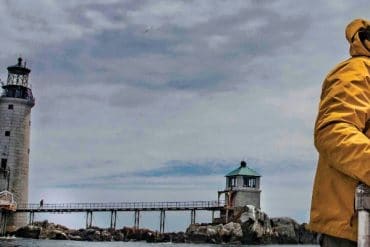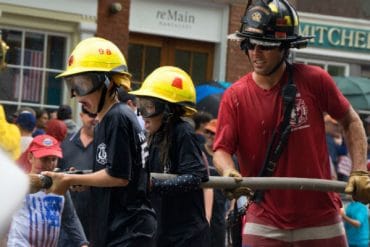THE TERM “WATERMAN” IS USED TO DESCRIBE RENAISSANCE MEN AND WOMEN OF THE OCEAN, MASTERS OF THE SEA. Today’s watermen can fix an outboard engine, tie a Bimini twist, and navigate in the fog by compass. They can look at the calendar, and the wind, and the tide and tell you where the fish are swimming or where the best surf break will be come morning. They know where to dig quahogs, find scallops, and can filet a five-hundred-pound tuna singlehandedly. These are men and women within whom water runs so deep that they are not content with having only one relationship with it. By boat, board, snorkel, rod and reel, or body, watermen hone time-earned skills by living their lives within the ebb and flow of Earth’s most ubiquitous substance.
 Captain Jim Briard rises to the top of a pretty short list when it comes to revered Nantucket watermen. Born on the island in 1955, Jim comes from a long line of men whose aquatic roots reach as far back as the whaling days. Just as his grandfather, father, and many uncles did before him, Jim enlisted in the Coast Guard at the age of seventeen, serving on an icebreaker that would take him from Antarctica to Alaska. Not long after his tour, he joined his father on a private sport fishing boat, Nazzarena, serving as mate at the age of twenty-two. Jim’s father captained the Nazzarena for thirty years, passing on his knowledge to his son and ultimately handing over the helm. “I tried to follow in his footsteps as much as he told me not to,” Jim remembers of his father. “Starting when I was eight or nine, when my dad had a day off, we would rent a surfboard from Snow’s Surf Shop on Main Street and go surfing at Cisco. I’d be in the water all day.
Captain Jim Briard rises to the top of a pretty short list when it comes to revered Nantucket watermen. Born on the island in 1955, Jim comes from a long line of men whose aquatic roots reach as far back as the whaling days. Just as his grandfather, father, and many uncles did before him, Jim enlisted in the Coast Guard at the age of seventeen, serving on an icebreaker that would take him from Antarctica to Alaska. Not long after his tour, he joined his father on a private sport fishing boat, Nazzarena, serving as mate at the age of twenty-two. Jim’s father captained the Nazzarena for thirty years, passing on his knowledge to his son and ultimately handing over the helm. “I tried to follow in his footsteps as much as he told me not to,” Jim remembers of his father. “Starting when I was eight or nine, when my dad had a day off, we would rent a surfboard from Snow’s Surf Shop on Main Street and go surfing at Cisco. I’d be in the water all day.
These days, when the waves grow to heights that relegate most surfers to the parking lot staring in awe, Jim is one of the few Nantucketers that can be found paddling out in to the swell. Yet, like many watermen, he is not one to talk about his conquests. A deeply humble man, when pressed a bout his greatest feats on the water, Jim deftly steers the discussion away from himself and onto his two sons. “The first time I ever pushed my kid into a wave and he stood up—that was a moment,” he says. “I actually thought about it the other night, when my son Jamie caught that striper off the beach. I just thought: Here I am. Kid is catching his first fish, and I’m here to be with him.” The two celebrated by going surfing.
“I think about it all the time: What is it that makes me feel so good about the water?” Jim says. “Is it in my blood? Did I get it from my great-grandfather, my grandfather, my dad? My mother’s side came from New Bedford, so they were fishermen. My great-great-great grandfather was in the whaling industry. Is that where it started?” He pauses and continues: “You get hooked on it. Being near the ocean is like medicine: it makes me feel so relaxed and soothed. I don’t even need to be in it. Sitting at my house, looking out the picture window at the rips, I just think, Yeah, this is why I live here.”
 Of course, the ocean is not an exclusive realm for men. Waterwomen like islander, Melanie Kotalac, also champion the tradition of living life on the ocean. At the age of ten, Melanie and her family moved from the coast of Rhode Island to Nantucket. A water- man in his own right, Melanie’s father brought up his family boating, fishing and clamming around the island. However, it wasn’t until Melanie met her future husband, Rick, that she graduated from a water enthusiast to water specialist, devoting her days to catching waves, trimming sails, and shucking scallops.
Of course, the ocean is not an exclusive realm for men. Waterwomen like islander, Melanie Kotalac, also champion the tradition of living life on the ocean. At the age of ten, Melanie and her family moved from the coast of Rhode Island to Nantucket. A water- man in his own right, Melanie’s father brought up his family boating, fishing and clamming around the island. However, it wasn’t until Melanie met her future husband, Rick, that she graduated from a water enthusiast to water specialist, devoting her days to catching waves, trimming sails, and shucking scallops.
The couple sailed the world, dotting lines down the Eastern Seaboard, to Bermuda, around the Bahamas, to Tortola and the British Virgin Islands, all about the Caribbean. “I have even sailed around Bali and Lombok,” she says. And they saw their fair share of weather and waves along the way, including a terrifying episode sailing in sixty-five knot winds when transporting a boat from Bermuda. “That was a pretty scary time,” she remembers. “We were in the shipping lanes and there was a tanker coming. The weather was bad. Even people here on Nantucket who knew we were crossing got in touch with the Coast Guard.” Sound boat handling by captain and crew delivered them through the storm and safely back to Nantucket.
Melanie also earned her stripes surfing. She’s part of a flourishing cadre of women carving out their own spots in the typically male-dominated lineup. Beyond Nantucket’s waters, the hunt for waves has brought her to surf breaks afar, including around the Galapagos Islands, where she experienced her most severe wipe-out yet. “It was really big, beautiful, barreling surf and I just got tangled up with a young local kid, and got a few waves on my head,” she says. “In surfing, you have to pay your dues.”
Just like her father before her, Melanie is passing the watermen ethos to her children, Zack and Mya, and they are taking to it like, well, fish to the sea. Mya is the top surfer in the Northeast for her age, and Zack has returned home to join the family business, Brant Point Marine. In the winter, Melanie commercially scallops, and she serves as the only woman on the Board of the Nantucket Shellfish Association. In this way, the water is not only a source of Melanie’s recreation, but also her livelihood. “I don’t think there is a waterman or a waterwoman,” she says. “I believe it gender: We are
transcends people of water.”
 Born on Nantucket in 1989, Parker Matthew Graham is a member of the next generation of watermen emerging on the island. As a kid, he roamed the town pier, sweeping the docks, putting in channel markers, and taking up odd jobs just to be by the ocean. Before long, the Marine and Coastal Resources Department took notice of the young man’s talent and enthusiasm, and gave him a two-year job studying shellfish and invasive crab species. Over the last five years, he has worked with his uncle, Billy, at Brant Point Marine, “doing everything that involves boats.” Parker can surf just about any wave Nantucket’s waters can produce, and he has an intimate understanding and respect for its force. “When you’re sitting out there, you can’t control what’s coming at you,” he says. “All you can do is apply your skill to that particular moment. You are in the now…living second by second.” Beyond the board, Parker has garnered knowledge on the water by helping deliver boats to Nantucket from other far-off islands. As with many watermen, he ranks remaining calm as one of the most important skills for surviving the ocean. “The ocean isn’t trying to kill you,” he says, “it doesn’t even know you are there. If you can keep your heart rate low, you are better able to use your skills to stay out of harm’s way.” When asked about the influences that created his passion for the ocean, Parker doesn’t hesitate to credit the community of Nantucket.
Born on Nantucket in 1989, Parker Matthew Graham is a member of the next generation of watermen emerging on the island. As a kid, he roamed the town pier, sweeping the docks, putting in channel markers, and taking up odd jobs just to be by the ocean. Before long, the Marine and Coastal Resources Department took notice of the young man’s talent and enthusiasm, and gave him a two-year job studying shellfish and invasive crab species. Over the last five years, he has worked with his uncle, Billy, at Brant Point Marine, “doing everything that involves boats.” Parker can surf just about any wave Nantucket’s waters can produce, and he has an intimate understanding and respect for its force. “When you’re sitting out there, you can’t control what’s coming at you,” he says. “All you can do is apply your skill to that particular moment. You are in the now…living second by second.” Beyond the board, Parker has garnered knowledge on the water by helping deliver boats to Nantucket from other far-off islands. As with many watermen, he ranks remaining calm as one of the most important skills for surviving the ocean. “The ocean isn’t trying to kill you,” he says, “it doesn’t even know you are there. If you can keep your heart rate low, you are better able to use your skills to stay out of harm’s way.” When asked about the influences that created his passion for the ocean, Parker doesn’t hesitate to credit the community of Nantucket.
Nantucket has long been a land of these tacticians of the sea, passing down skills and stories that culminate in people like Jim Briard, Melanie Kotalac and Parker Graham. The watermen tradition is both earned and inherited—the only requirement is to share it with the next generation




